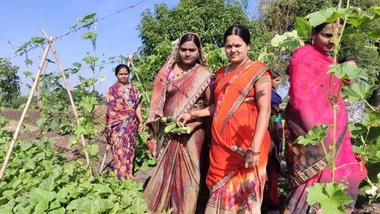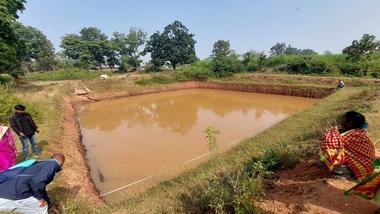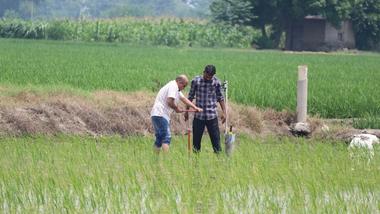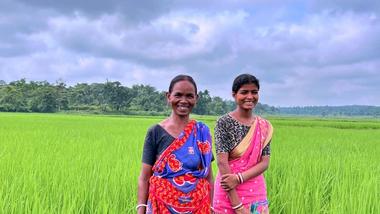
Droughts are well-known for causing significant crop losses.
However, a recent World Economic Forum (WEF) report reveals that excessive rainfall has been almost as detrimental. Between 2015 and 2021, 35 million hectares of crops were lost due to drought in India, while 33.9 million hectares were lost due to excessive rains. Water security is often narrowly defined as water scarcity, but as we can see, an excess of water can be equally damaging. Given that agriculture employs 40% of India's population, the impact of these losses is profound.
Over a decade ago, the Hindustan Unilever Foundation was born to help create water for the public good and support regions and agricultural communities most susceptible to water challenges.
Actions that have made a difference across India

Promoting water-efficient crops and techniques in one-acre farming
In Osmanabad, Maharashtra, inconsistent rainfall, rocky terrain, and a lack of surface water have led to overdependence on groundwater, mainly through bore wells. Over the past 30 years, farmers have increasingly sowed water-intensive cash crops like soybean, sugarcane, and BT cotton, which are unsuited to the region's climate.
With our partner Swayam Shikshan Prayog (SSP), we started working with women farmers to find a solution to boost agricultural produce and livelihoods. We launched the one-acre farming model, where women were encouraged to cultivate crops like vegetables, millets, and pulses on small plots, using bio-inputs and water-efficient techniques such as drip irrigation. The success of this model has led to widespread change, with over 35,000 women farmers expanding the practice to larger areas, helping conserve billions of litres of water.

Community-led natural water harvesting solutions
The plateau regions of West Bengal, with uneven terrain, heavy rainfall and deforestation, have a unique challenge of soil erosion severely impacting the lives of local tribal communities. We studied the region's topography, and our partner, PRADAN (Professional Assistance for Development Action), actively involved the community in devising a solution for water and food security tailored to local needs. As a result, in collaboration with local civil bodies and the community, we created natural water harvesting structures like tanks and ponds that conserve billions of litres of water in several villages. Over 25,000 farmers have benefited from this initiative.

Using IoT-based technologies for water-efficient agriculture
Agriculture is a critical driver of Punjab's economy, with paddy and wheat grown extensively in the state- both water-intensive crops. Over the years, this has contributed to depleting groundwater levels: 117 of 150 blocks in the state have been overexploited.
To help tackle water challenges, we partnered with the Centers for International Projects Trust (CIPT). We work with farmer cooperatives in Punjab to promote solutions for the water-efficient cultivation of paddy and wheat, including the use of new technologies. For instance, we have introduced IoT-based soil moisture sensors that estimate the water needed. When the fields require water, the sensors send advisory text messages to farmers, who then irrigate their fields based on these inputs. This helps conserve both water and electricity. In 2022-23, the initiatives benefitted 14,000+ farmers while creating a water potential of billions of litres.

Training women agri-water professionals for efficient resource use
In Balrampur, an aspirational district in eastern Uttar Pradesh, agriculture is increasingly becoming an unviable form of livelihood for small and marginal farmers due to rising input costs and poor yields. Our partner, People's Action for National Integration (PANI), has intervened to train an all-women cadre of agri-water professionals. The cadre supports these farmers to adopt simple yet innovative agricultural practices that use resources more efficiently and improve farmers' yields and incomes. Farmers are encouraged to shift away from entrenched behaviours through a range of approaches—video dissemination sessions where they learn about new irrigation methods, field demonstrations that visualise these techniques, providing access to high-quality seeds, bio-inputs, market linkages, and more. Over 71,000 farmers have benefited from this initiative in the previous year.
The power of collective action for a water secure future
Innovative solutions and collective action have the potential to tackle significant environmental challenges.
As World Water Week kicks off, the need for close water cooperation as a key requirement for global peace and security is more pertinent than ever. Water Security implicitly requires the right quantity of water, of the requisite quality, at the right time—and in the right format.
Our robust actions through the Hindustan Unilever Foundation have created a cumulative water potential of over 3.2 trillion litres, enough to meet India's drinking water needs for more than two years.

